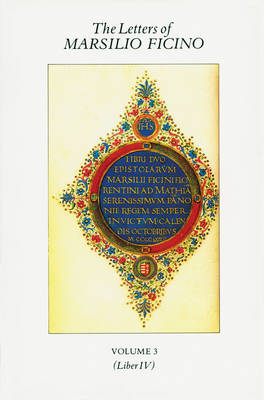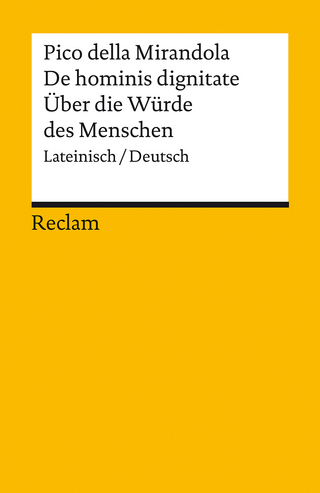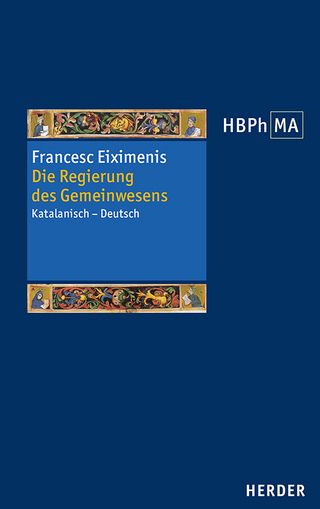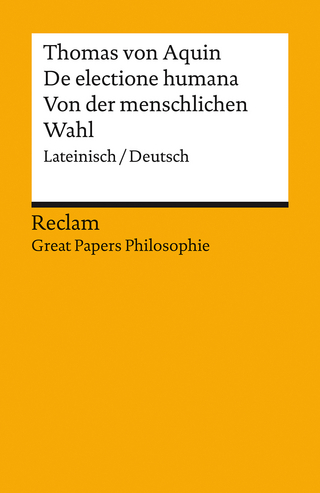
The Letters of Marsilio Ficino
Seiten
1999
Shepheard-Walwyn (Publishers) Ltd (Verlag)
978-0-85683-045-7 (ISBN)
Shepheard-Walwyn (Publishers) Ltd (Verlag)
978-0-85683-045-7 (ISBN)
The third volume of the letters of Marsilio Ficino, who was an influential figure of the Italian Renaissance. It consists of the 39 letters Ficino published in his book IV, which he dedicated to Matthias Corvinus, King of Hungary.
Marsilio Ficino (1433-99) directed the Platonic Academy in Florence, and it was the work of this Academy that gave the Renaissance in the 15th century its impulse and direction. During his childhood Ficino was selected by Cosimo de' Medici for an education in the humanities. Later Cosimo directed him to learn Greek and then to translate all the works of Plato into Latin. This enormous task he completed in about five years. He then wrote two important books, "The Platonic Theology" and "The Christian Religion", showing how the Christian religion and Platonic philosophy were proclaiming the same message. The extraordinary influence the Platonic Academy came to exercise over the age arose from the fact that its leading spirits were already seeking fresh inspiration from the ideals of the civilizations of Greece and Rome,and especially from the literary and philosophical sources of those ideals. Florence was the cultural and artistic centre of Europe at the time and leading men in so many fields were drawn to the Academy: Lorenzo de' Medici (Florence's ruler), Alberti (the architect) and Poliziano (the poet).
Moreover, Ficino bound together an enormous circle of correspondents throughout Europe, from the Pope in Rome to John Colet in London, from Reuchlin in Germany to de Ganay in France. Published during his lifetime, "The Letters" have not previously been translated into English. This third volume consists of the 39 letters Ficino published in his book IV, which he dedicated to Matthias Corvinus, King of Hungary. During the period covered by the letters in this volume, Ficino was working on a revision of his translations of Plato's dialogues and his commentaries on them. Some of the letters consist largely of passages taken from the dialogues, for example, those in praise of matrimony, medicine and philosophy. the largest single letter is a life of Plato which furnishes some interesting parallels with Ficino's own life, as described in a near contemporary biography by Giovanni Corsi which is included, partly for this reason, at the end of the volume. Corsi comments - "The first thing which encouraged me to write about this man was that he himself not only investigated the precepts and mysteries (of the Platonic Academy) but also penetrated, laid open and expounded them to others.
This was something which no one else for the previous thousand years so much as attempted, let alone accomplished."
Marsilio Ficino (1433-99) directed the Platonic Academy in Florence, and it was the work of this Academy that gave the Renaissance in the 15th century its impulse and direction. During his childhood Ficino was selected by Cosimo de' Medici for an education in the humanities. Later Cosimo directed him to learn Greek and then to translate all the works of Plato into Latin. This enormous task he completed in about five years. He then wrote two important books, "The Platonic Theology" and "The Christian Religion", showing how the Christian religion and Platonic philosophy were proclaiming the same message. The extraordinary influence the Platonic Academy came to exercise over the age arose from the fact that its leading spirits were already seeking fresh inspiration from the ideals of the civilizations of Greece and Rome,and especially from the literary and philosophical sources of those ideals. Florence was the cultural and artistic centre of Europe at the time and leading men in so many fields were drawn to the Academy: Lorenzo de' Medici (Florence's ruler), Alberti (the architect) and Poliziano (the poet).
Moreover, Ficino bound together an enormous circle of correspondents throughout Europe, from the Pope in Rome to John Colet in London, from Reuchlin in Germany to de Ganay in France. Published during his lifetime, "The Letters" have not previously been translated into English. This third volume consists of the 39 letters Ficino published in his book IV, which he dedicated to Matthias Corvinus, King of Hungary. During the period covered by the letters in this volume, Ficino was working on a revision of his translations of Plato's dialogues and his commentaries on them. Some of the letters consist largely of passages taken from the dialogues, for example, those in praise of matrimony, medicine and philosophy. the largest single letter is a life of Plato which furnishes some interesting parallels with Ficino's own life, as described in a near contemporary biography by Giovanni Corsi which is included, partly for this reason, at the end of the volume. Corsi comments - "The first thing which encouraged me to write about this man was that he himself not only investigated the precepts and mysteries (of the Platonic Academy) but also penetrated, laid open and expounded them to others.
This was something which no one else for the previous thousand years so much as attempted, let alone accomplished."
| Erscheint lt. Verlag | 1.1.1999 |
|---|---|
| Reihe/Serie | The Letters of Marsilio Ficino |
| Übersetzer | School of Economic Science Language Department |
| Zusatzinfo | illustrations, notes, bibliography, index |
| Verlagsort | London |
| Sprache | englisch |
| Maße | 150 x 230 mm |
| Themenwelt | Geisteswissenschaften ► Philosophie ► Philosophie des Mittelalters |
| ISBN-10 | 0-85683-045-3 / 0856830453 |
| ISBN-13 | 978-0-85683-045-7 / 9780856830457 |
| Zustand | Neuware |
| Informationen gemäß Produktsicherheitsverordnung (GPSR) | |
| Haben Sie eine Frage zum Produkt? |
Mehr entdecken
aus dem Bereich
aus dem Bereich
von der menschlichen Wahl
Buch | Softcover (2024)
Phillip Reclam (Verlag)
7,40 €


